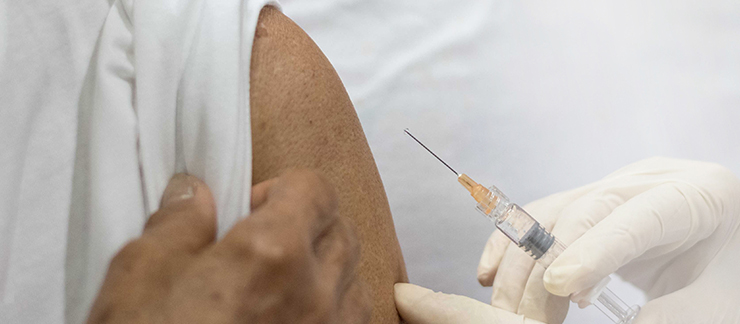
Four Important Vaccines that Protect Seniors Against Infection
It’s true, vaccinations aren’t just for the young. You still need shots in your senior years to protect against infection. Weakened immunity systems and medical conditions make maturing adults more susceptible to viruses that cause the flu, shingles, ear infections, pneumonia and other ailments. Vaccines received in childhood often become less effective over time, requiring the elderly to receive a booster. Getting the right immunizations at specific time intervals during the senior years protects an aging body against infection to stay healthy.
Recommended Immunizations for Aging Adults
|
Vaccine |
50 – 64 years |
65+ years |
|
1 dose annually |
1 dose annually – high dose |
|
One dose Tdap then booster Td every 10 years |
|
|
One dose |
|
|
2 doses or 1 dose of Zoster live |
|
Source: https://www.cdc.gov/vaccines/schedules/downloads/adult/adult-combined-schedule.pdf
- Influenza Inactivated Vaccine (Flu Shot) — Annually
Influenza (or flu for short) is a contagious respiratory illness caused by influenza viruses that infect the nose, throat, and lungs, explains the Center for Disease Control (CDC). Anyone at any age can get sick from the flu. Seniors, especially those with poor health and chronic conditions such as diabetes and heart disease, are at higher risk of developing serious complications that can lead to hospitalization. Adults in nursing homes and care facilities also are more susceptible to the flu, a reason to consider in-home care so seniors can remain in the comfort and safety of their own homes.
Vaccines that help the body to develop antibodies to protect against viruses are the best Flu Prevention for the Elderly. In fact, flu vaccines are reported as 80% effective in preventing flu-related deaths among seniors who receive them. The CDC recommends everyone over the age of 6 months to get a flu shot. Different flu vaccines are made for different age categories. A higher dose vaccine called Flu Zone High Dose that contains 4x antibodies than regular flu shots is designed for adults aged 65 and older. New on the market is an adjuvant flu vaccine called Fluad is cited as 60% more effective than regular vaccines. A nasal spray vaccine is not recommended for adults over age 59. For greatest effectiveness, ensure everyone who comes in contact with your senior gets a flu shot, including caregivers. People with allergies should talk to their physicians before getting a flu shot.
- TD or Tdap Vaccine – One Booster Every 10 Years and One Tdap Booster at Age 65
These vaccines help prevent three serious diseases caused by bacteria including:
- Tetanus or lockjaw: a rare disease causing muscle stiffness and spasms. Advanced cases lead to tightening of the head and neck muscles that result in difficulty breathing and swallowing. Tetanus kills about 1 out of every 10 infected people.
- Diphtheria: another rare disease that causes a thick membrane to cover the back of the throat, creating breathing problems, paralysis, heart failure and death.
- Pertussis or whooping cough: signaled by severe coughing that causes breathing difficulties, vomiting and interrupted sleep. Five in 100 adults are hospitalized with pertussis or have complications including pneumonia and death.
- Since the availability of the Tdap vaccine, tetanus and diphtheria cases dropped about 99% and pertussis cases by 92%. According to the CDC, adults, 65 and older, should get one booster dose of Tdap.
- Pneumococcal Vaccines — One Dose of Each of Two Vaccines Over the Age of 65
Two different vaccines (pneumococcal conjugate and polysaccharide) protect against pneumococcal disease, infections caused by Streptococcus pneumoniae bacteria known as pneumococcus. The bacteria are contagious and spread by coughing and sneezing. Resulting infections include pneumonia, meningitis and others that affect the ears, lungs and bloodstream. The CDC reports that in extreme cases, pneumococcal disease results in deafness, brain damage, or loss of limbs. Seniors with chronic health conditions and compromised immune systems are at higher risk of getting pneumococcal pneumonia.
The pneumococcal polysaccharide vaccine (PPSV23 or Pneumovax®) and pneumococcal conjugate vaccines together protect against 36 types of pneumococcal bacteria. Both are recommended for seniors 65 years or older, but are not administered simultaneously. Your physician should advise you on the correct order and timing of shots. Medicare Part B also covers 100% of the cost for both pneumococcal vaccines (when administered at least 1 year apart).
- Zoster – Two Doses Over the Age of 50
This vaccine protects against shingles, a virus caused by the reactivation of the chickenpox. Traveling down the body’s nerve fibers, it creates a rash on the body or even the head that can cause extreme pain, burning and itching. While typically lasting 3 to 5 weeks, some unfortunate individuals experience long-lasting effects with continuous pain.
People who had chickenpox have a higher chance of getting shingles, especially those older than 50. In fact, half of all shingles cases occur in adults aged 60 or older with the risk of getting shingles greatly increasing by age 70, reports the National Institute on Aging. It can recur more than once, with increased severity each time. People who never had chickenpox can get it from someone with shingles.
The recombinant shingles vaccine was approved by the FDA in 2017 for shingles prevention. Clinical trial results indicate it is more than 90% effective in preventing shingles. Two doses, 2 to 6 months apart, are recommended for adults 50 and older.
Medicare Part B covers the cost of flu shots and pneumococcal vaccines.
However, Medicare Part D (prescription plan) covers the cost of shingles and Tdap shots.
Refer to your Medicare drug plan to verify coverage.
Ensure seniors are current with vaccinations by asking physicians to check their personal records and scheduling missing shots. While you can get flu shots at the pharmacy, doctors may want to administer others in their offices or a designated hospital. While no one likes to get a shot, one moment of discomfort can avoid serious illness.


